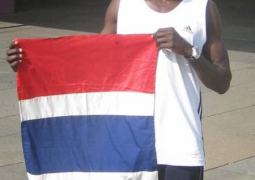Mutarr Jammeh of Bonto village testified yesterday, as the second prosecution witness, before magistrate Emmanuel Nkea, in the trial of nine persons related to the illicit drug cocaine at the special narcotics court of the Banjul Magistrates' Court.
The nine accused persons, all foreign nationals, were arrested recently at Bonto village in the Western Region with two and half tonnes of cocaine reportedly worth one billion
Testifying for the prosecution, Mr. Jammeh told the court that he is a farmer, and that he recognised the first and second accused persons.
According to him, the first accused person frequently came to Bonto to buy shrimps from the villagers. The second accused, Carlos Juan and one Pepe, who is said to be at large, also frequented Bonto.
"I got to know the first accused person when he gave me a contract to make cement blocks for him for his store," he revealed.
"In 2009, the alkalo of the village (village head) once summoned the villagers, and informed them that the first accused said he needed a plot of land at the beach side to build a store for fish," PW2 told the court.
He added that the villagers agreed to allocate the plot of land on the grounds that the village youths can work at the proposed fish store project, and also the project when completed would prevent salt-water intrusion into the women's garden.
"The 1st accused agreed with the terms and conditions, and also proposed to build an Arab Islamic School for the village, which he did," PW2 further revealed.
PW2 went on to inform the court that after they gave him the land, the first accused started constructing something just like a warehouse.
"I visited the site when construction started, and at the finishing, when the roof, doors and windows were all ready," he told the court.
"I found the brick-layers doing some finishing work at the warehouse, and I saw a big hole in the warehouse just like a soakaway," Jammeh told the narcotics court.
He added that he could not ascertain the breath and length, "but is from one corner to the other".
"I asked the 1st accused about the said hole, but the 1st accused told me that it will be used for fuel storage, as fishermen can buy the fuel there instead of going to Brikama," he added.
PW2 further said that this was after the warehouse was completely roofed, and that the 1st, 2nd accused persons and Pepe were the ones who fixed the door at the main gate, and kept it locked. The three of them were responsible for the warehouse, Jammeh further told the court.
According to PW2, the first accused person used to come there almost every week, and the second accused person once in a while. He said Pepe used to come to Bonto almost every day, but he (Pepe) did not stay in Bonto.
At that juncture PW2 stopped his testimony, which is expected to continue at the next adjournment date, on 30 September 2010.
Meanwhile the alkalo of Bonto village, Momodou Lamin Kebbeh, who was the first prosecution witness, yesterday ended his testimony under cross-examination by defence counsel Lawyer LS Camara.
PW1 said he saw the underground hole collecting water, adding that most of what he said before the court were things told him by the people, because he did not go to the site frequently.
He said he knew the first accused in the shrimps business, but the drug business was discovered when security officers raided the warehouse.
Asked by defence counsel LS Camara whether the top of the underground hole was done in concrete, Jammeh in reply said: "I don't go there frequently, as I stated earlier in my evidence; I was informed by the workers."
He said the 1st accused promised to build the Arab Islamic school for the villagers, which he did with three classrooms, but the school was without a fence.
Read Other Articles In Article (Archive)
Happy Tobaski
Sep 23, 2015, 9:21 AM
Theft case progresses
Aug 27, 2012, 11:26 AM


